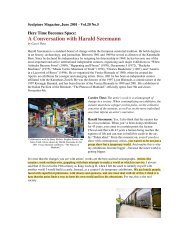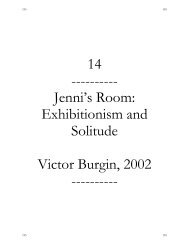Untitled
Untitled
Untitled
Create successful ePaper yourself
Turn your PDF publications into a flip-book with our unique Google optimized e-Paper software.
The City in the Age of Touristic Reproduction<br />
Cities originally came about as projects for the future: People moved from<br />
the country into the city in order to escape the ancient forces of nature and<br />
to build a new future that they could shape and control themselves. The entire<br />
course of human history until the present has been defined by this movement<br />
from the country into the city—a dynamic to which history in fact owes its<br />
direction. Although life in the country has repeatedly been stylized as the<br />
golden era of harmony and “natural” contentment, such embellished memories<br />
of a life spent in nature have never restrained people from continuing on<br />
their chosen historical path. In this respect, the city per se possesses an intrinsically<br />
utopian dimension by virtue of being situated outside the natural order.<br />
The city is located in the ou-topos. City walls once delineated the place where<br />
a city was built, clearly designating its utopian—ou-topian—character. Indeed,<br />
the more utopian a city was signaled to be, the harder it was made to reach<br />
and enter this city, be it the Tibetan city of Lhasa, the celestial city of Jerusalem,<br />
or Shambala in India. Traditionally cities isolated themselves from the<br />
rest of the world in order to make their own way into the future. So, a genuine<br />
city is not only utopian, it is also antitourist: it dissociates itself from space<br />
as it moves through time.<br />
The struggle with nature, of course, did not cease inside the city either.<br />
At the beginning of his Discourse on Method, Descartes already observed that<br />
since historically evolved cities were not entirely immune to the irrationality<br />
of the natural order they would in fact need to be completely demolished if<br />
a new, rational, and consummate city were to be erected on the vacated site. 1<br />
Later on, Le Corbusier called for the demolition of Paris to make way for a<br />
new rational city to be built in its place. Hence the utopian dream of the<br />
total rationality, transparency, and controllability of an urban environment<br />
unleashed a historical dynamism that is manifested in the perpetual transformation<br />
of all realms of urban life: the quest for utopia forces the city into<br />
a permanent process of surpassing and destroying itself—which is why the<br />
city has become the natural venue for revolutions, upheavals, constant new







